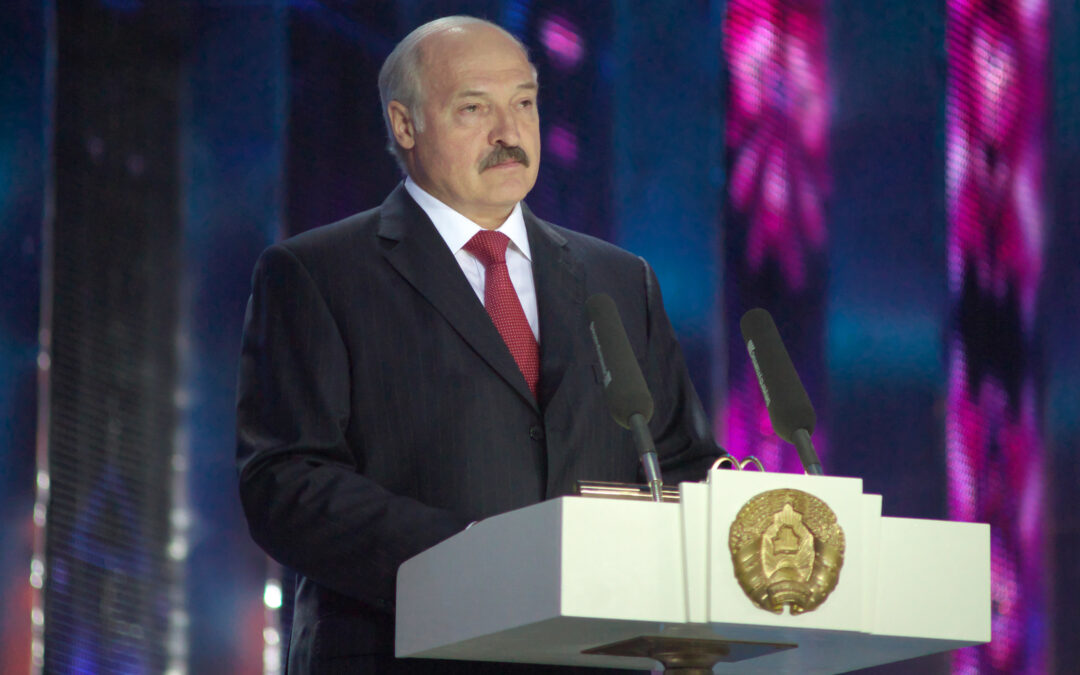President Alexander Lukashenko has warned that there will be a “brutal reaction” from Belarus to the deployment of Polish tanks near the two countries’ border. He claims that Poland “might start a war with us”.
The comments mark the latest escalation in rhetoric amid a surge in migration across the border orchestrated by the Belarusian authorities. The heightened tensions stretch back to Lukashenko’s disputed election victory last year, since when Poland has openly supported the democratic Belarusian opposition.
Lukashenko yesterday claimed that Poland has moved tanks to the border as part of its response to thousands of illegal crossings by people from the Middle East, Asia and Africa.
“This is just another excuse to bring troops closer to the Belarusian borders,” said Lukashenko, quoted by Polskie Radio. “We will react brutally, regardless of any criticism from them.”
The Belarusian president said that the response could involve moving more of its own, and also Russian, forces to the border. He was speaking during a meeting with Russian prosecutor general Igor Krasnov.
On Tuesday, Lukashenko also told Yury Karayeu, inspector for the Grodno region bordering Poland, to “keep an eye on what they’re doing on the other side of the border. Keep me posted. They are real scoundrels. I am afraid that they might start a war with us”, reports the Polish Press Agency (PAP).
The dictator said that #Poles would fight migrants with "Leopard" tanks, which they are already moving to the border of the "Union State of Belarus and Russia". In response, he promised to move #Russian and #Belarusian troops to the borders with the #EU. pic.twitter.com/LGrDYNeutt
— NEXTA (@nexta_tv) October 28, 2021
In response to the migration crisis, Poland has strengthened its military presence at the border. This week it announced that a further 2,500 troops would be stationed there, bringing the total to 10,000. Over the weekend, two Polish soldiers were hospitalised after clashes with people seeking to cross from Belarus.
Poland is not known to have used tanks in its effort to prevent border crossings. However, last week the defence minister, Mariusz Błaszczak, revealed that the 10th Armoured Cavalry Brigade was being moved from western Poland to the region of Biała Podlaska near the border with Belarus for a training exercise.
Wojsko Polskie codziennie aktywnie realizuje plan szkolenia. Z zachodniej Polski w rejon Białej Podlaskiej z #10BKPanc przemieszcza się 700 żołnierzy wraz ze sprzętem. Doskonalimy mobilność i szybkie dostosowanie do sytuacji. Dbamy o bezpieczeństwo Polaków. pic.twitter.com/OyiVFclvDT
— Mariusz Błaszczak (@mblaszczak) October 22, 2021
Belarus last month itself carried out large-scale military exercises with Russia involving up to 200,000 personnel. The operation, entitled Zapad (meaning “West”), was a test of how ready the countries’ forces would be to conduct operations on NATO’s eastern flank.
The Polish authorities have argued that Belarus is using migrants as “living weapons” in a “hybrid war” against Poland and the EU. Lithuania and Latvia, which also border Belarus, and the European Commission have likewise condemned Lukashenko’s “instrumentalisation” of migrants.
Polish Prime Minister: Unfortunately, we do not expect a soothing of tension on the eastern border. In a few days Zapad-2021 – the largest military exercises in 40 years – begin. Military exercises of this magnitude could be related to a number of provocations. https://t.co/KDmhsV3so7
— Denis Kazakiewicz (@Den_2042) September 6, 2021
Last year, after the Polish government expressed support for the Belarusian democratic opposition and called on Belarus to reorganise a presidential election marred by widespread evidence of fraud, Lukashenko accused Poland of wanting to grab former Polish territory from Belarus.
He received support from Russia, which accused the Polish government of “openly interfering in the domestic affairs of Belarus”. The Kremlin “urged Warsaw to return to the universally accepted norms of international law and renounce its policy of undermining the sovereignty of its neighbour”.
In August this year, however, Lukashenko changed tack, saying that his country needed to find a “common language” with Poland and calling for a return to “normal relations”. Since then, however, his regime has facilitated the passage of thousands of migrants to Minsk, from where it then seeks to send them into the EU.
Main image credit: Prachatai/Flickr (under CC BY-NC-ND 2.0)

Daniel Tilles is editor-in-chief of Notes from Poland. He has written on Polish affairs for a wide range of publications, including Foreign Policy, POLITICO Europe, EUobserver and Dziennik Gazeta Prawna.




















